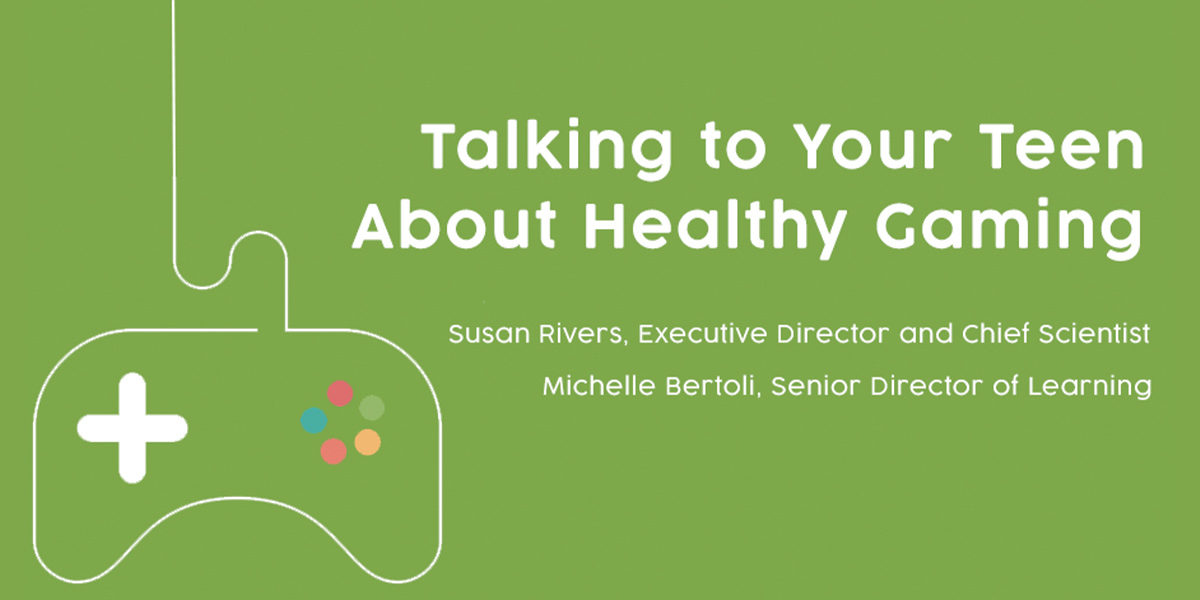
Talking to Your Teen About Healthy Gaming
At iThrive, we know what video games can do for teens. Here are some strategies for approaching and having interactions with teens about them.
Many parents struggle with how to manage the amount of time their teens spend playing video games and ensuring healthy gaming habits. While the C.S. Mott Children's Hospital National Poll on Children's Health found that 71% of parents believe video games can be good for teens, nearly half of the parents polled also reported that gaming can get in the way in teens' lives, including family activities.
At iThrive, we know video games can offer teens meaningful opportunities to feel masterful, connect with others, and explore who they are and what they care about. In fact, parent and friendship researcher Lydia Denworth believes video games offer "a critical form of socializing." How can parents embrace this perspective in their interactions with their teens and encourage healthy gaming?
We've compiled some strategies for approaching and having interactions with teens around video games. To start, you'll need to get curious about why teens are playing. These tips allow parents to have conversations about video games in ways that respect teens and encourage healthy gaming.
-
-
Pay Attention To Your Posture: When you notice your teen is heading full-speed into hour 3 of video games for the day, what happens in your body? You might get tense, cross your arms, raise your voice, or go silent and steely without even being aware that you're doing it. It is a parent's job to set limits in your household, including for screen time. But getting mad or leading with disapproval is a surefire way to alienate your teen, stoke conflict and dissuade any fruitful conversation about developing healthy gaming habits. Set a small challenge for yourself to notice your body when approaching your teen about gaming. Practice an open posture: arms loose and relaxed at your sides, chest expansive and forward-facing, face and jaw relaxed, voice calm. Your body language signals to your teen either that it's time to get defensive and wall off, or that it's safe to venture some authentic sharing.
-
Listen Generously: Experts warn against dismissing or minimizing your teens' genuine interest in video games, no matter how mystifying it may be to you. Neuroscientist and mom of two former teenagers Frances Jensen shares, "The teen years are a great time to test where a kid's strengths are, and to even out weaknesses that need attention. What you don't want to do is ridicule, or be judgmental or disapproving or dismissive." Make time to engage with your teen around healthy gaming without rushing. Ask questions with genuine curiosity, "How do you decide which game to play? How do you learn how to play? What's interesting to you about this?" Think about a hobby you enjoy that might, on the surface, seem silly or trivial. Why do you like it? Chances are it's meeting a real and important need that makes you human. Video games are meeting some real and important need for your teen. Be curious about what it is. You might learn a lot about what makes your teen tick by asking open-ended questions from a place of genuine curiosity.
-
Make It A Shared Experience: Your teen is an expert in gaming, and you can learn a lot by grabbing a seat on the couch and requesting a tutorial on your teen's favorite title. (But prepare to be swiftly defeated!) Try exploring a new game together, with shared newbie status. "Couch co-op" games (meaning you're playing together in the same shared physical space) like Jackbox Party Packs, Overcooked, FIFA Soccer, Super Smash Bros., and many other titles offer a chance to associate a new emotional experience with your teen's gaming. Playing together is a chance to bond and have fun. It also will cement the message for your teen that you want to "get" and be involved in their passion and that you see its inherent value.
-
Game designer Jane McGonigal proposes that droves of people care so deeply about video games because they crave opportunities to solve tough problems and to test their limits in ways that real life often does not reliably provide. In your teen's case, there may be opportunities to find outlets for these needs and emotions outside of and in addition to video games. But you can't get a clear picture of those needs by standing on the sidelines, wishing things were different or waiting for this "phase" to end. When discussing healthy gaming with your teen, challenge yourself to step beyond your comfort zone with real curiosity, to meet your teen inside the magic circle and see what's so appealing there. You just might be pleasantly surprised by the richness you discover.

